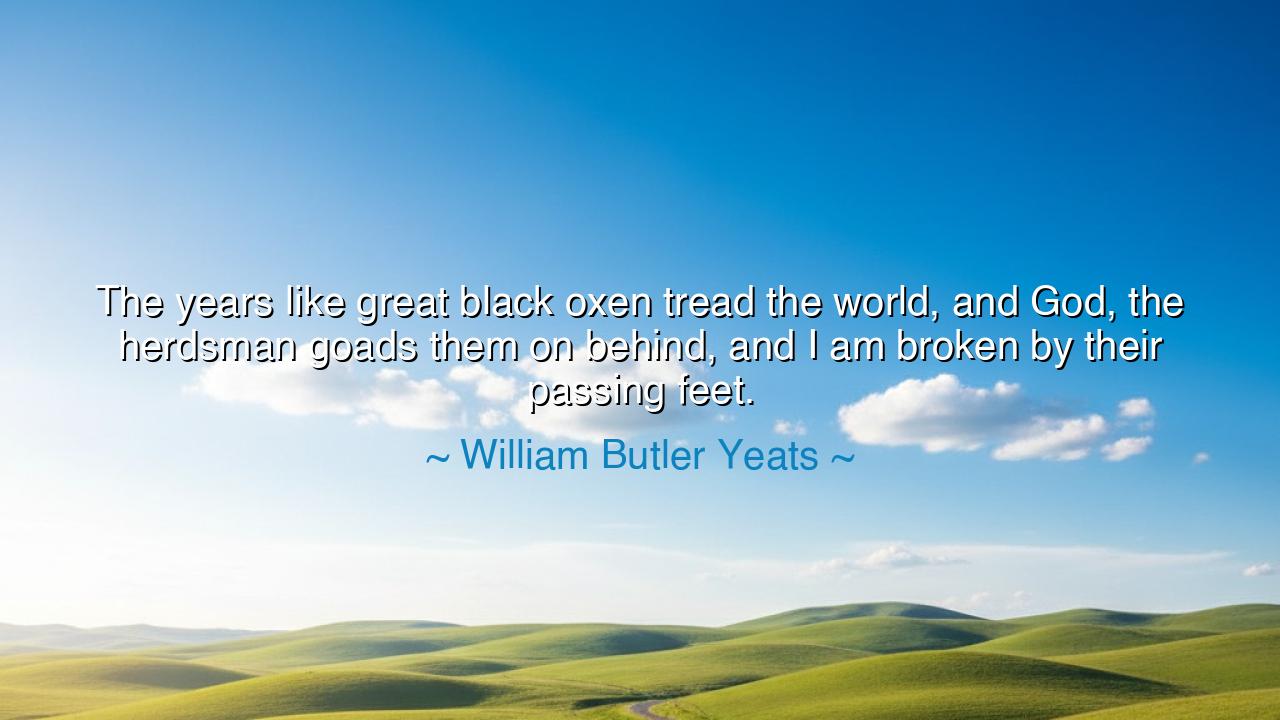
The years like great black oxen tread the world, and God, the
The years like great black oxen tread the world, and God, the herdsman goads them on behind, and I am broken by their passing feet.






“The years like great black oxen tread the world, and God, the herdsman goads them on behind, and I am broken by their passing feet.” — Thus wrote William Butler Yeats, the poet-prophet of Ireland, whose words shimmer with the sorrow and grandeur of time itself. In this line, drawn from one of his early works, Yeats gives voice to the ache of mortality and the relentless march of the ages. He imagines the years as mighty beasts — black oxen, heavy and unceasing, their hooves pounding upon the earth — while God, the eternal herdsman, drives them forward. Between the divine and the mortal stands the poet himself, fragile and finite, crushed beneath the weight of time’s eternal motion.
In this image lies a vision of life both majestic and terrible. The oxen symbolize the passing of time — slow, powerful, indifferent. They move without malice, yet their strength destroys all that stands in their path. Every man and every nation lies, in the end, beneath their trampling feet. The herdsman, who is God, does not halt their march, for it is through their passage that the divine will unfolds. Time is the servant of eternity, and its motion is the rhythm of creation itself. Yeats, with the heart of a mystic, saw this not as cruelty, but as the unchanging law of the universe — that all things born into time must also be broken by it.
Yeats wrote these words in the twilight of the nineteenth century, an age trembling on the edge of change. The world he loved — of myth, spirit, and beauty — was giving way to the iron age of machinery, reason, and war. His Ireland was rising in rebellion, his youth was slipping away, and his faith in romantic ideals was being tested by the harshness of reality. He felt the years pressing upon him like a burden too great to bear, grinding down the dreams of his generation. Yet even as he lamented, he found in this suffering a strange form of grace — for to be broken by time is also to be shaped by it, as the sculptor’s chisel shapes stone.
To understand Yeats’s meaning, one may look to the fate of all great civilizations. The Roman Empire, once radiant in power, fell beneath the heavy tread of history’s oxen. Its temples crumbled, its legions vanished, yet from its ruins rose the seeds of new worlds. So, too, the poet reminds us that even as time destroys, it also renews. The passing of the oxen is not only death, but transformation — a reminder that God, the herdsman, guides not toward despair, but toward a greater purpose unseen. The crushing of the old gives birth to the new.
There is also in Yeats’s words a profound human truth — that each of us, in our brief span, feels the weight of time. Youth fades, dreams alter, loved ones depart, and the body bends beneath invisible burdens. Yet even as we are broken, something within us endures — the soul, which like Yeats’s spirit, bears witness to the divine order behind the seeming cruelty of change. To be broken by the years is not to be defeated, but to be tempered — as steel is made stronger by the hammer and flame.
Consider, for example, the life of Nelson Mandela. He spent twenty-seven years in a prison cell, his youth consumed by the long march of time. Many would have emerged bitter or broken, yet he came forth purified, patient, and wise — a man remade by suffering. The years that might have destroyed him instead shaped him into an instrument of reconciliation. So it is with all who endure: those who do not flee the tread of time, but learn to walk in rhythm with it, are lifted beyond their pain into a higher strength.
Thus, my children, let Yeats’s lament become your wisdom. The years will tread upon you; there is no escaping their step. They will take from you much — your youth, your illusions, your ease. Yet they cannot take your spirit, unless you give it willingly. When sorrow comes, when the world shifts beneath your feet, remember the herdsman behind the oxen. There is purpose in the passage of time, and even in the pain of its crushing. If you walk humbly, with patience and courage, the years will not destroy you; they will reveal what is eternal within you.
So heed the poet’s cry, not as despair, but as revelation: “The years like great black oxen tread the world.” Let them tread. For though their feet may break the body, they cannot trample the soul that trusts the hand of the herdsman. Stand firm in faith, endure with dignity, and know that from every ruin, God shapes renewal — and from every sorrow, the spirit learns the eternal rhythm of His design.






AAdministratorAdministrator
Welcome, honored guests. Please leave a comment, we will respond soon